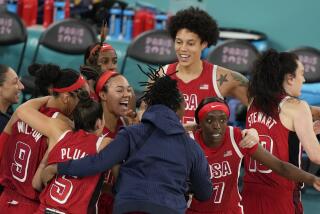It Stays Ugly to the End : Basketball: United States trounces Russia, 137-91, to win World Championship.
- Share via
TORONTO — They were no Dream Team and this was no dream but on the last day of the 1994 World Championships, the world finally got to see what American basketball could be.
The U.S. players made 16 of their first 17 shots Sunday, led by 49 points and went on to defeat Russia, 137-91, before 32,616 in the SkyDome to capture the gold medal.
Even if they couldn’t match the 44 points a game by which the Dream Team drubbed blissed-out foes in the NBA’s international debut at the Barcelona Olympics in 1992, the Americans won by a tidy average of 25. If you’re wondering when this competition will get competitive, Don Nelson’s suggestion is don’t hold your breath.
“As long as our best players continue to come and play,” said the U.S. coach, “it’ll be a long time. And maybe never.”
The NBA’s participation remains a bonanza for promoters--FIBA set single-game and tournament attendance records in Toronto--and for international coaches, confident that playing the best is the surest path to progress.
It poses a hardship only for the 12 American players. It’s a marketing godsend for the NBA but it’s still like driving a bulldozer over an ant hill or asking Heifetz to play at a kids’ violin recital.
If the Dream Team, with its Monte Carlo “training camp” and adoring crowds, made it look like fun, this tournament was a reality check. This was days of tedium, moments of boorishness. American players were bored out of their skulls and finally, after Saturday night’s cure-for-insomnia game against Greece, admitted it.
Kevin Johnson said they were “going through the motions.” Joe Dumars, the most gentlemanly of the Americans by a Louisiana mile, called it “a very long ordeal.” The real American triumph might lie in the fact that, on a squad with several of the loosest cannons in the NBA, no one went off.
If the U.S. players thought they had a tough tournament, it was nothing compared to some others, such as:
Canada--The host team, bent on medaling, limped in seventh. Said embattled Coach Ken Shields, obviously with mixed feelings: “Seventh place out of 200 teams is nothing not to be proud of.” Canadian players complained about the publicity the Americans were getting, lack of fan support, tenor of the media coverage and their coach. Center Mike Smrek met two Toronto reporters to set the record straight, asking a distinction be made “between Ken Shields, the human being, and Ken Shields, the coach.”
Croatia--Coach Giuseppe Gierga zinged stars Toni Kukoc and Dino Radja for being out of shape. Radja said no one in the tournament could stop him but went four for 16 in the semifinal loss to Russia. Kukoc, who recently signed a six-year, $26-million contract with the Chicago Bulls, was a virtual no-show against Russia, taking only eight shots, scoring five points.
Greece--An easy draw and a 4-1 record vaulted the Greeks into the semifinals. Coach Makos Dendrinos accepted wipeouts by Croatia and the United States, resting his players for Sunday’s bronze medal game, in which they were drilled anyway, 78-60, by Croatia. Said a Greek reporter to Dendrinos in the news conference: “Our pride has turned to bitterness.”
Cuba--It finished 15th and two players defected.
Needing a big finish, the United States got a setup in the Russians, who had played the United States and Croatia in consecutive games. However, it’s hard for five players to make 16 of 17 shots even with no one guarding them, but that’s what the Americans did.
Afterward, Reggie Miller said they had won the gold “for the little kids in their driveways.”
Shawn Kemp made the traditional poor-us speech: “It was a little disappointing. After all, we were playing for our country, trying to win a gold medal. . . . Being compared to that first team so much, it got real old after awhile. I thought we were coming here to do the same thing they did, which was win. But to be compared like that sometimes takes the joy out of it.”
Of course, the U.S. players set themselves up, claiming extravagantly and often that they could beat the Dream Team. They got the gold, they’re going home and, at last, there’s no taking the joy out of it.
More to Read
Go beyond the scoreboard
Get the latest on L.A.'s teams in the daily Sports Report newsletter.
You may occasionally receive promotional content from the Los Angeles Times.










